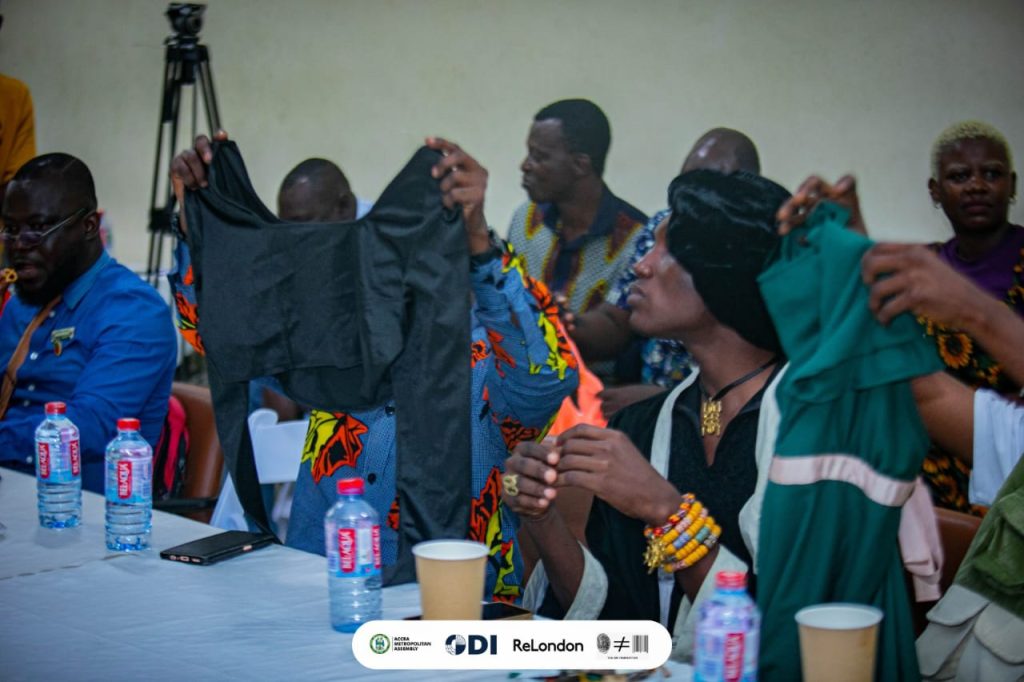By Patrick Ofoe Nudzi
Accra, Oct. 17, GNA – A five-day circular economy and textile exchange workshop to address textile waste challenges in Ghana and across Africa has ended in Accra with a call for sustainable textile management.
Organised by the Accra Metropolitan Assembly (AMA) in partnership with Africa-Europe Mayors’ Dialogue, the event enabled participants to build collaboration and exchange practical knowledge on sustainable textile management, recycling, and innovative circular business models.
The event, brought together over 100 participants, including policymakers, industry leaders and circular economy advocates from cities like London, Durban and Freetown, to explore sustainable textile management practices and foster cross-border collaboration.
Madam Elizabeth Kwastoe Sackey, in an address delivered on her behalf by Mr Solomon Noi, Director of the Waste Management Department, AMA, said Accra had struggled in managing secondhand clothing waste because the city lacked adequate resources to process it.
Mr Noi said Accra’s collaboration with international cities was to adopt a circular model for waste management, outlined plans to sort it, collect textiles separately while learning best practices and innovations of partner cities in the Global North.
He said the collaboration could help Accra establish mechanical recycling and upcycling, transform waste into economic opportunities related to recycling textiles for use in construction and other industries since the city’s informal sector makes up 80% of Accra’s economy, Madam Kenji Maghoma, Communications and Production Specialist, External Engagement at the Africa Europe Mayors Dialogue, said the Dialogue was a platform of African and European Mayors to collaborate and deliver innovative and practical solutions with over 20 cities forming the partnership of equals.
“The exchange was part of ongoing efforts to promote city diplomacy across continents, bringing together policymakers, city actors, SMEs, designers, makers, and community groups,” Madam Maghoma said.

She said at a technical cooperation level, the exchange would focus on two main areas being waste management and recycling techniques and business models and innovation whilst at the policy and advocacy level, the objective was to assess how city diplomacy and cooperation could support policy change and reform
Liz Ricketts, Founder of The Or Foundation, said the Kantamanto Market received approximately 15 million garments weekly, a situation she described as a global crisis resulting from excessive production and consumerism in the Global North.
Ms Ricketts said the high volume of clothing exports labelled as “charity” or “recycling” often had little or no value upon arrival in Ghana and therefore called for global accountability by implementing Extended Producer Responsibility (EPR) policies to support communities impacted by textile waste.
Rachel Singer, Circular Economy Advisor at ReLondon, said, London’s Environment Strategy includes ambitious goals to eliminate biodegradable and recyclable waste from landfills by 2026 and to raise recycling rates to 65% by 2030, with ReLondon equipping local authorities, empowering small- and medium-sized businesses, and encouraging Londoners to embrace new consumption models.
She said London, in 2019, consumed 154,600 metric tonnes of clothing and discarded 142,700 metric tonnes, equivalent to 48 new items and 44 discarded items per person.
The workshop included site visits to Kantamanto Market and presentations by sustainable fashion designers, which aimed to strengthen policy advocacy for circular practices.
GNA